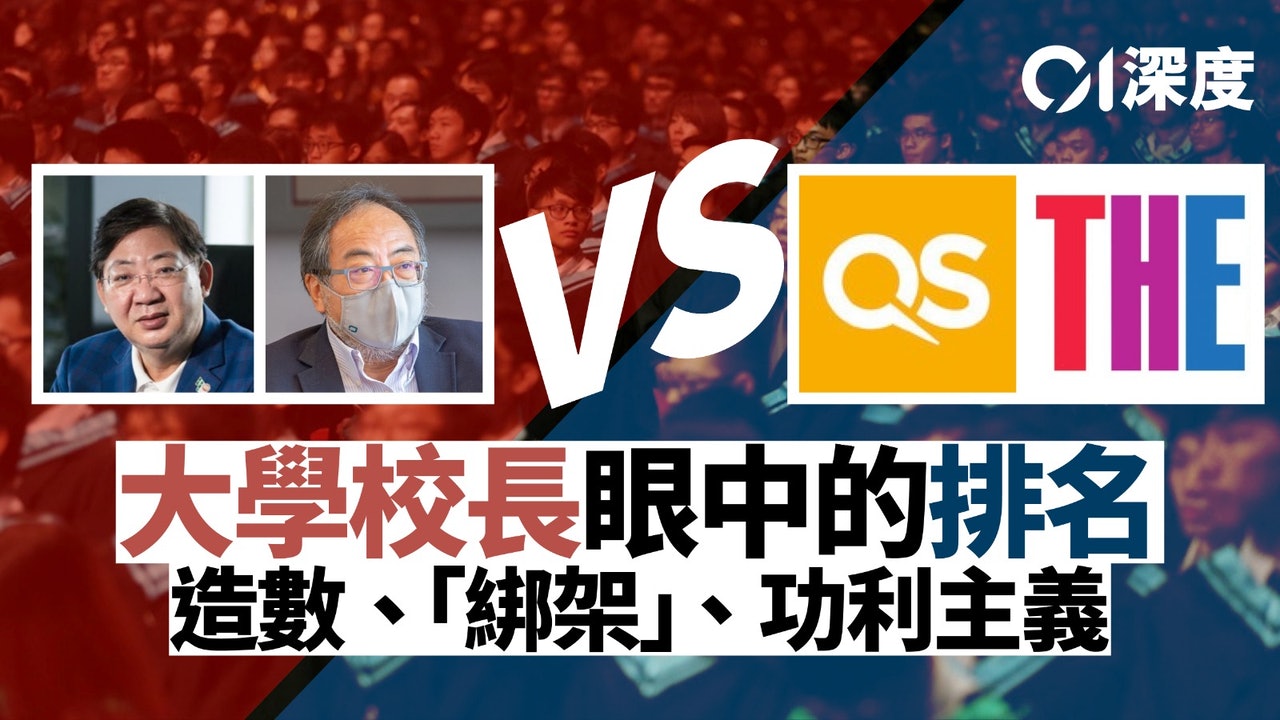On June 1, the British educational publication "Times Higher Education" (THE) announced the 2022 Asian University Rankings. The University of Hong Kong, the Chinese University of Hong Kong, and the Hong Kong University of Science and Technology remained in the top ten in Asia.
Although university rankings are only a commercial product, they are often used to prove the educational level of a region. For example, the SAR government and business elites "talk about" Hong Kong's five top 100 universities in the world. However, there are voices questioning from time to time. Institutions of higher learning have been "kidnapped" by international rankings, and the pursuit of rankings has been described as a "necessary evil".
A month ago, mainland state media reported that Renmin University of China, a well-known university, had announced its withdrawal from the world university rankings, which aroused widespread discussion in society.
"Hong Kong 01" had a dialogue with Xu Lizhi, former President of the University of Hong Kong and Dean of the Hong Kong Academy of Sciences, and He Shunwen, President of the Hang Seng University of Hong Kong, to look at the phenomenon of "University Rankings" and reflect on the relationship between university rankings and university education.
He Shunwen, president of Hang Seng University, said at the ceremony that the university will not invest resources in the ranking game in the future.
(Photo by Li Zetong)
Universities dare not speak out about rankings
"The university must have a strong character and adhere to the concept." In 2018, the Hang Seng Management School was approved to be "upgraded" to the Hang Seng University.
At the launch ceremony of the name rectification, He Shunwen made it clear that Evergrande would not invest resources to participate in the ranking game in the future, and also once persuaded the senior management of other colleges and universities, "There is no need to respond to the ranking, and the decline should be used as a reference."
Behind these remarks is He Shunwen's different understanding of the international rankings: "There are too many frauds in the international rankings of universities. Many people know it, but they are 'dare to be angry and not to speak out'."
First, there is the issue of the independence and recognition of ranking agencies.
He Shunwen pointed out that in the world's mainstream university rankings, the research and ranking institutions are "commercial in nature" and lack supervision. "You can 'open a file' to make a ranking today, and you don't need a license."
"It can be said that it is disruptive (destructive) corporate innovation." Xu Lizhi expressed a similar point of view, laughing that "University Rankings" are "food for business".
He briefly sorted out that in the current rankings of the world's mainstream universities, Times Higher Education (THE) and Quacquarelli Symonds (QS) in the United Kingdom are themselves one, "THE itself is an educational media, not a ranking." When the two institutions cooperated Discovering that there are business opportunities in the university rankings, "making a lot of money", they split up and launched their own rankings.
Xu Lizhi, a former president of the University of Hong Kong and dean of the Hong Kong Academy of Sciences, said the international university rankings are a "disruptive innovation" for companies.
(File photo: provided by the interviewee)
Rating agencies are both football certificates and players
As a commercial organization, business cooperation and monetary transactions are naturally indispensable, and this will inevitably damage the independence of rankings.
Xu Lizhi mentioned that the way ranking institutions evaluate the reputation of schools is to "do questionnaires" and conduct surveys with educators around the world. "If you recognize a certain university, check it." But at the same time, these institutions will also " "Education" organizes international conferences, and if the university sends staff to participate, it can increase its popularity among its peers and have the opportunity to get a higher score.
Xu Lizhi recalled that Malcolm Grant, the former president of University College London (UCL), once came to Hong Kong to attend an education conference hosted by a ranking agency and openly debated with the agency "whether university rankings are useful".
Naturally, the ranking agencies are on the pros, and Malcolm is on the negative.
"Malcolm studied law. Regarding the university rankings, he gave a very organized and exciting speech. Once he finished speaking, the audience was slapped." Xu Lizhi's words changed, "What was the result? That year, UCL's Ranking "Bang Bang" went up."
"Why? Because everyone in the education circle knows this school." Xu followed with a big laugh, "Isn't it ironic, you say?"
"Organizations are both football licenses and players. While ranking, they cooperate with colleges and universities to advertise in publications." He Shunwen criticized that these institutions that produce rankings do not have a "firewall". There is a conflict of interest.
"Just as the auditors will not be consultants, they must be separated to be independent and credible."
He Shunwen pointed out that the index of the ranking agency will "simplify" education.
(Photo by Ou Jiale)
Failure to objectively measure the achievements of humanities and social institutions
The second is the scientific question of ranking evaluation.
"The institution's indicators simplify education to 'very important'." He Shunwen pointed out that more indicators that can be quantified will be used in the ranking, and some indicators that cannot be quantified will be ignored.
For example, the number of academic papers, the advanced level of instruments, and the proportion of international teachers and students are all indicators that can be "digitized", but the proportion of evaluation around teaching is relatively small, "because the quality of teaching is difficult to measure (measure)."
He Shunwen's criticism is not aimless.
Wang Baojin, a scholar at Taiwan's Chung Yuan University, and Weng Jiarong, an officer at Li Ruifang Vocational School, once published a paper entitled "Key Indicators Affecting the Three World Ranking Systems". The data and scoring indicators are used as samples, and statistical model analysis is used to find the key performance that affects the international university rankings.
In the 2022 THE Asia University Rankings, Beijing Tsinghua University ranks first in Asia.
(Visual China)
The paper found four "key dimensions" running through the three rankings: teaching, internationalization, academic output and academic prestige.
Among them, "the academic prestige dimension has the highest influence, and the teaching dimension has the lowest influence"; and, "no matter which ranking system is used, the key factor affecting the ranking results is the academic output or academic prestige indicator."
Therefore, the value orientation of the "International University Rankings" is to focus on "internationalization", "academicization" and even "scientific and technological".
Under this circumstance, colleges and universities with local characteristics, emphasis on teaching, or achievements in humanities and social sciences obviously suffer in international rankings.
Taking Renmin University of China as an example, in 2021/22, the QS World Ranking of Renmin University of China ranks 599th in the world and 31st in Mainland China; THE world ranks 601st, and Mainland China ranks 28th.
However, the National People's Congress's student resources and school performance are all top-notch, in fact, it is not inferior to "Qingbei".
In terms of student sources, the National People's Congress's annual admissions scores for liberal arts college entrance examinations are in the top 5% of mainland provinces and cities.
The humanities and social sciences majors of the National People's Congress are second to none.
In terms of running a school, in the "Fourth National Discipline Evaluation" issued by the Ministry of Education, the National People's Congress's economics, law, sociology, statistics, and business administration ratings are all the highest "A+", that is, the top 2% in the country or Top two.
Other disciplines that can receive this rating include Tsinghua University, Peking University, and Fudan University.
This means that the performance of the National People's Congress in humanities and social sciences is similar to that of Tsinghua University and Peking University in the "top 100 in the world", but because of its relatively backward science and engineering disciplines, even if it has accumulated long-term cultural, historical and philosophical background, it cannot win a suitable international ranking for it. .
Although Renmin University of China is not ranked high in the world, its academic strength in humanities and social sciences is not inferior to that of Tsinghua University and Peking University.
(file picture)
International Ratings Can't Obliterate Local Characteristics
But then again, are "internationalization", "academicization" and "technicalization" the scoring criteria of ranking institutions and the "golden standard" of higher education?
The UCL President Malcolm mentioned above once asked in the British "Guardian": "The most fundamental problem is that there is no definition of an ideal university. Is (the ideal university) big or small? Do research or focus on teaching? Yes To become a professional scientific and technological institution with a large amount of research income, or to give priority to the development of humanities and social sciences? Is it necessary to take risks or avoid risks in running a school?”
From the struggle between the National People’s Congress and international rankings, it can be seen that there are “values” differences between international rankings and university education. Rankings, as an external evaluation tool, cannot reflect the actual situation of university internal education, but may obliterate university characteristics.
Take "internationalization" as an example. This concept has dominated Hong Kong for a long time. The society generally respects British and American universities and binds "English" to "elite".
He Shunwen made a comment in the media as early as 2013, questioning that "blindly following the British and American academic models or applying foreign standards" in higher education institutions would lead to the "McDonald's" of education.
He Shunwen believes that local colleges and universities should first maintain their own cultural characteristics and create the concept of "Asian University" or "Chinese University". It will work.”
At the "Hong Kong Top Ten Principals Education Forum" in 2015, Sung Zuyao, the then president of the Chinese University of Hong Kong, also emphasized that "internationalization does not mean 'McDonald's', and there is no need to copy universities all over the world, like McDonald's. The hamburger is the same, and then compare which McDonald's is bigger." Sung also pointed out that the uniqueness of CUHK lies in its "Chinese cultural and historical background", which can attract students from all over the world.
Sung Zuyao, former president of the Chinese University of Hong Kong, pointed out that the "internationalization" of colleges and universities does not mean "McDonald's".
(file picture)
Research and academics do not shoulder the responsibility of teaching and educating people
Having said that, Chinese University has also been coerced by "internationalization".
Historically, CUHK is indeed a leader in Chinese cultural studies.
The CUHK was formally established in 1963, not only breaking the unwritten convention of "only one institution of higher learning in a colony" in the United Kingdom, but also the first "Chinese-taught" university in Hong Kong.
The fire of "Chinese" started by CUHK later evolved into the "Chinese Movement", and even successfully fought for the British Hong Kong government to make Chinese the official language in 1974.
However, since Li Guozhang, who had studied medicine in the UK, became the principal in the 1990s, the teaching of CUHK has also changed to English.
According to CUHK's admissions website, its undergraduate course "Chinese Studies" is "taught in English".
For local students, it is really difficult to understand the culture and knowledge of their own country through a foreign language.
As for "academicization", it cannot be denied that universities have the mission of "academic research", but also shoulder the responsibility of "teaching and educating people".
It is true that science, technology, engineering and mathematics (STEM) have direct contributions to improving social productivity, but humanities and social sciences are also beneficial to improving the efficiency of social operation and maintaining social harmony and stability.
Universities must chase after the "pearl in the crown", but they should never neglect talent cultivation for this reason.
After all, human resources are the key to sustainable academic development.
It can be said that academic output-oriented rankings are inevitably biased when assessing the core function of higher education, which is "talent appreciation".
"The ranking only looks at the output (result), not the input (input)." He Shunwen pointed out that if some colleges and universities in economically backward areas lack financial support, they are naturally at a disadvantage in the rankings, "but this does not mean that colleges and universities are ranked. The teaching level is low", "comparing its investment or finding that its efficiency in cultivating talents is high."
The Chinese University of Hong Kong is a leader in the study of Chinese culture among the universities in Hong Kong, but it has also been coerced by "internationalization".
(Photo by Lu Yiming)
Ranking and quality are not necessarily linked
Xu Lizhi said frankly that there is "no necessary connection" between university rankings and the teaching quality of universities.
"You can say that there will be some relationship. For example, the school has famous professors, and the level of knowledge is high. The ranking will consider the ratio of teachers and students, and it will also affect the quality of teaching." He continued, "However, the key is, how do you go about it? To measure the contribution of school graduates to society?”
For example, ranking agencies have tried to use “graduate donations” to measure “student achievement.” “The more money you donate, the higher the student achievement and the higher the school’s teaching quality.” However, the drawbacks of this measure are also obvious, “Then the university will We will recruit some students with rich backgrounds and better backgrounds!”
A more serious problem is that a biased evaluation system will "force" colleges and universities to do "facade work".
Useless competition not only consumes the energy and resources of college administrators, but also has a negative impact on the quality of college education.
"There are a lot of details in the international rankings, and you can "do the numbers"." Xu Lizhi gave an example. The indicators of academic level are generally the number of papers and the number of well-known professors, so there will be chaos in colleges and universities "buying articles" elephant.
"What do you mean? The school will bring back a professor who has a lot of theses, (even if) he doesn't teach until he retires, his number of papers will follow, and the school's academic score will be higher," he explained.
The contribution of students to society is difficult to quantify.
(file picture)
"Competition" invades the original intention of running a school in colleges and universities
"After the whole thing becomes 'doing the numbers', everyone will 'fight and do it'!" Xu Lizhi emphasized that biased rules will lead to problems, "If the Olympic rule is that you can 'eat medicine' to run a marathon, then let's all 'do it together'. Food and medicine!”
"Food and medicine" is not desirable, but it just reflects the "evil" created by this "ranking game" - "competition" is invading the original intention of running a university.
Is "competition" a good thing?
The liberal economy advocates "competition" and believes that "competition" can force market players to improve production efficiency and reduce product prices.
But the core of the problem is that colleges and universities are not pure enterprises, and competition among colleges and universities is not pure market competition.
He Shunwen said that education is imperceptible, and it takes time for the value to appear. However, out of business considerations, institutions will publish rankings every year. "Schools can only attract attention if they go up and down." In this case, short-sighted rankings are very short-sighted. It is difficult to fairly measure the long-term impact of education. "Education is not a game of football, and competition should not be encouraged. Instead, we hope that everyone can improve, maximize value with less resources, and innovate more."
Of course, international rankings are not "useless". As a "packaging strategy", they are more "efficient" in the promotion of university admissions and reduce the public's cognitive cost.
The International University Rankings, jointly launched by THE and QS in 2004, are now widely accepted.
For example, some employers regard "graduating from the top 100 universities" as their recruitment criteria, and the SAR government also talks about "there are five or less 100 universities in Hong Kong", to demonstrate the high level of higher education in Hong Kong.
Stakeholders in higher education, such as the SAR government and the Education Grants Committee, also attach importance to university rankings.
(file picture)
It's always been like this, right?
"Actually, the international rankings are like the popular 'lazy bag'," Xu Lizhi said.
However, what is popular and widely used does not necessarily mean "correct", just like Lu Xun's inquiries about the old Chinese feudal system in "The Diary of a Madman"——"It has always been this way, right?"—— Although the ranking is easy to use, the society should also treat it objectively and rationally.
He Shunwen suggested that ranking agencies should abandon the "single ranking" and switch to ranking according to specific topics, which would be more meaningful. "Even the corporate rankings will have specific indicators such as market value, number of employees, and turnover, so university rankings can also be used. Ranked according to themes, such as internationalization ratio, environmental protection, patents, and contribution to a certain discipline”, because the specific rankings can help universities to use them as a reference when optimizing school running, find their own shortcomings, and also allow the public to better understand the advantages of universities .
"The world is more utilitarian. If even universities surrender to utilitarianism, it will be very dangerous." He Shunwen said.
He Shunwen believes that universities should not surrender to utilitarianism.
(file picture)





/cloudfront-eu-central-1.images.arcpublishing.com/prisa/SA64QHEFJFGB3OONE7GHYBUNBU.jpg)
/cloudfront-eu-central-1.images.arcpublishing.com/prisa/MNACP55MFZEWDPW5ELRNS5IENE.jpg)

/cloudfront-eu-central-1.images.arcpublishing.com/prisa/PZPEEEUGKRCO3JJYTV72EIJGLM.JPG)
